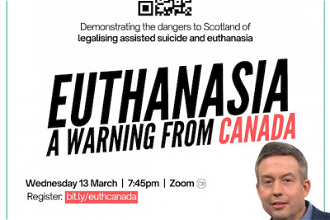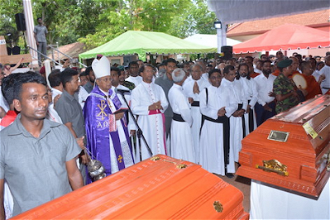Catholic Union urges Government of Jersey to 'pause and reflect' on assisted suicide plans

The Catholic Union has called on the Government of Jersey to pause and reflect on its plans to make assisted suicide lawful on the island. In response to the latest consultation on the proposed new law - which could come into effect as early as 2025 - the Catholic Union has raised a number of concerns and urged authorities to listen to the island's Catholic community.
While not part of the United Kingdom, the Catholic Union highlighted the close ties between Jersey and Great Britain. It said that the prospect of Jersey becoming the first part of the British Isles to legalise assisted suicide was a matter of great concern to Catholics in Britain.
The Catholic Union warned that there would be clear practical implications of the decision to introduce assisted suicide in Jersey, especially in the provision of health and social care, as well as the prospect of the new law setting a precedent for other parts of the British Isles.
The Union has expressed its hope that the details confronting the Government of Jersey around the introduction of assisted suicide, will make them reflect on the right course of action before pushing ahead with any changes to the law. They also urged the Government to carry out research into the provision of palliative care on the island.
The consultation, which closed on 14 January, comes in the same month as the House of Commons Health and Care Select Committee concludes a call for evidence on the possibility of introducing assisted suicide in England and Wales. The Catholic Union will be submitting evidence to the inquiry based on the results from a recent survey of their members and supporters.
Catholic Union Director, Nigel Parker, comments: "The situation in Jersey is extremely serious. While proposals are at an advanced stage, there is still time for the Government to pause and reflect. This consultation shows just how difficult safeguards and exemptions will be to introduce in practice. It is a thorny issue for any government to grapple with, especially as healthcare systems are still struggling in the wake of the pandemic.
"Given the close ties between Jersey and the UK, any new law would not only have an impact for people living on the island but for people across the British Isles. It is vital that the implications of this decision are properly understood. The Catholic Union will continue to monitor the situation carefully."
LINKS
More information about the consultation can be found here: www.gov.je/Caring/AssistedDying/Pages/AssistedDying.aspx
Catholic Union: www.catholicunion.org.uk
The Catholic Union's full submission to the consultation can be found at Appendix 1:
Assisted dying public consultation
Government of Jersey
Ground floor
19-21 Broad Street
St Helier
Jersey, JE2 3RR
13 January 2023
Dear Consultation Team
Please accept this letter as the response from the Catholic Union of Great Britain to the consultation on assisted suicide proposals in Jersey. We note that the consultation uses the term "assisted dying" but we consider that the more realistic term is "assisted suicide" and will use that term in our response.
We are happy for the contents of this letter to be quoted. A copy of this letter will be made available to members and supporters of the Catholic Union.
Background
The Catholic Union is a membership organisation that works with others to represent the views and interests of the 4.5 million Catholics in Britain and advance the common good. We bring the experience and expertise of Catholic laity from all walks of life into the public sphere.
While Jersey is not part of the United Kingdom, it is part of the Roman Catholic Diocese of Portsmouth, and we fully support the statements made by Bishop Philip Egan on this matter. We strongly encourage you to listen to the views expressed by the Catholic community of the island as part of this consultation.
As part of the British Isles, and one of the Crown Dependencies, there are close social, political and cultural ties between Jersey and Great Britain. Developments on the island of Jersey are watched closely by Catholics in Britain, especially where questions of morality and human dignity are concerned.
The prospect of Jersey becoming the first territory within the British Isles to legalise assisted suicide is a matter of great concern to Catholics in Britain. Given the deep links between Jersey and Great Britain, there are clear practical implications of any decision, especially in the provision of health and social care, as well as the prospect of setting a precedent for other parts of the British Isles.
Church teaching
The Catholic Union is resolutely opposed to the introduction of assisted suicide in any form, including the proposals set out by the Government of Jersey. This position is based on the clear imperative in natural law, which is reflected in the teaching of the Catholic Church. Samaritanus Bonus (The Good Samaritan), a letter published in September 2020 by the Congregation for the Doctrine of the Faith, approved by Pope Francis, states:
"Assisting in a suicide is an unjustified collaboration in an unlawful act that contradicts the theologal relationship with God and the moral relationship that unites us with others who share the gift of life and the meaning of existence."
This teaching is the product of two thousand years of careful thought and deliberation on human flourishing. It forms part of the wider body of work known as Catholic Social Teaching, which has at its heart the understanding that human beings are created in the image and likeness of God and possess intrinsic value.
Consultation proposals
We appreciate that these proposals are at an advanced stage, and this consultation deals with many of the practical challenges of introducing assisted suicide. In confronting these challenges, we hope that the Government of Jersey will pause and reflect on the right course of action before pushing ahead with changes to the law.
For the purposes of this consultation, we will limit our response to those areas where our expertise allows us to comment - including conscientious objection for medical professionals and premises, the requirement to inform people about assisted suicide, making appeals and recording cause of death.
We will include results and comments from a recent online survey of our members and supporters on assisted suicide, which ran from 9 December 2022 - 9 January 2023.
Q. 8 Do you agree that health professionals should have the right to refuse to undertake a supporting assessment (or provide their professional opinion), if that information may be used by an Assessing Doctor to make a determination on the person's eligibility for an assisted death?
Yes - they should have the right to refuse.
The importance of service to others instilled by our Catholic schools has encouraged many Catholics to pursue a career in heath or social care. The reason many people, not only Catholics, choose to work in healthcare is the ability to help others and support them when they are most in need.
In the Catholic Union's recent survey on assisted suicide, 88 per cent of responders said that introducing assisted suicide would make it harder for Catholics and other people of faith to enter the medical profession.
A number of responders pointed to the pressures faced by medical professionals in Canada, which recently introduced assisted suicide. Other responders said that certain areas of the medical profession in Great Britain were already becoming "no go" areas for Catholics, such as obstetrics and gynaecology, on account of deficiencies in conscientious objection policy and practice. One responder said:
"It is already difficult for Catholics to enter the medical/ nursing profession. Any move to make assisted suicide easier would make it much harder, and some areas of medicine impossible to work in. Furthermore it would be a barrier to accessing care for those millions of patients who care about this issue and would be concerned about their medical professionals' commitment to their care knowing that assisted suicide were possible."
It is vital that any new law contains a clear and robust right for medical professionals not to be involved with any aspect of assisted dying, and that such a right be effective in practice. The proposed requirement that no one should be required to "directly participate" in the assessment, approval or delivery of an assisted death should be broadened to "any involvement" in such tasks.
Any new law that made it harder for Catholics to enter the healthcare profession would be an extremely regrettable step, and risk exasperating problems with staff shortages in health and social care.
Q. 9 Do you think that a conscientious objection clause should provide a premise owner/operator the right to refuse an assisted death on their premises (for example, a care home provider may choose not to permit a resident to have an assisted death in their room, even though it is the person's place of residence or care)?
Yes - they should have the right to refuse.
The Catholic Church has a long tradition of providing social and palliative care, and of supporting the work of others in this area. This work was summarised in a document published in December 2019 by the Caritas Social Action Network.
We are aware of at least one Catholic care provider on the island of Jersey, and there may be others. It is vital that the values and ethos of such places are protected by a specific conscientious objection clause for premises. This right should not only be for care homes where there is a religious background, but for any premise owner/operator that wishes not to allow assisted suicide.
In the Catholic Union's recent survey on assisted suicide, 87% of responders said there was not enough palliative care support for people in England and Wales. One responder commented:
"Good Palliative care is a feature of our health care system but there is never enough. People fear that their symptoms will not be managed or controlled. Palliative care clinicians are far more creative in finding solutions to intractable symptoms. General clinicians lack expertise in this area. Community support provided by hospice is high quality but largely funded by charitable donations."
We appreciate this may not reflect the situation in Jersey, and strongly encourage the Government to commission its own research into people's experience of palliative care on the island before moving forward with proposals for assisted suicide.
Q. 15 Do you agree that the law should not prohibit professionals from raising the subject of assisted dying?
No - we do not agree.
According to the consultation document, "It is proposed that the law neither prohibits health and care professionals from raising the subject of assisted dying with their patients or clients, nor requires them to do so."
We believe this approach could create a grey area in which expectations and understanding may change over time. It would be preferable to include a requirement in law for health and care professionals not to raise assisted suicide with those in their care. This would make it clear that any suggestion of assisted suicide would need to come from the patient.
Q.16 Do you agree that the law should not place an explicit requirement on relevant professionals (e.g. those working in GP surgeries or hospital departments) to tell people about assisted dying service?
Yes - we agree.
This is vital if conscientious objection is to be properly understood and upheld as part of any new law.
We have already commented on the concern amongst Catholics in Britain at the impact that assisted suicide would have on Catholic medical professionals. We strongly encourage the Government of Jersey to work with the Catholic community on the island and medical bodies in exploring these concerns further.
The fear of a culture developing in which assisted suicide becomes the norm or even expected outcome in certain situations, is felt strongly by Catholics working in health and social care. In response to the Catholic Union's recent survey on assisted suicide, one person commented:
"I'm a carer at a care home. If they introduce assisted suicide I would find it very difficult and upsetting since all life is sacred. I would not like to be part of the process and if I had to give advice about this, I could lose my job for sharing my beliefs. I would not be promoted."
Q.19 Should the law allow for the option of a waiver of final consent?
No - the law should not allow for the waiver of final consent.
Allowing a waiver of final consent presents the terrible prospect of a person being deemed to have lost their decision-making capacity and being 'assisted to die' while in fact resisting the administration of the lethal medication. A doctor in the Netherlands was prosecuted for murder in these circumstances and the risks are simply too great.
Q. 22 Do you agree that the law should provide for appeals to the Royal Court?
Yes.
Given the seriousness of the proposals being considered, there should be the right of appeal available to both patients and family and close friends.
Q. 29 Do you agree that the medical certificate of the fact and cause of death, and hence the register of deaths, should accurately record the cause of death as assisted dying?
Yes.
It is vital that in circumstances in which someone was helped to end their life, that this is recorded on their death certificate.
We would be happy to provide further information to any of these questions or meet representatives from the Government of Jersey to provide evidence in person.
Thank you for considering our response to this consultation.
Yours faithfully
Nigel Parker
Director
Catholic Union of Great Britain
director@catholicunion.org.uk





















